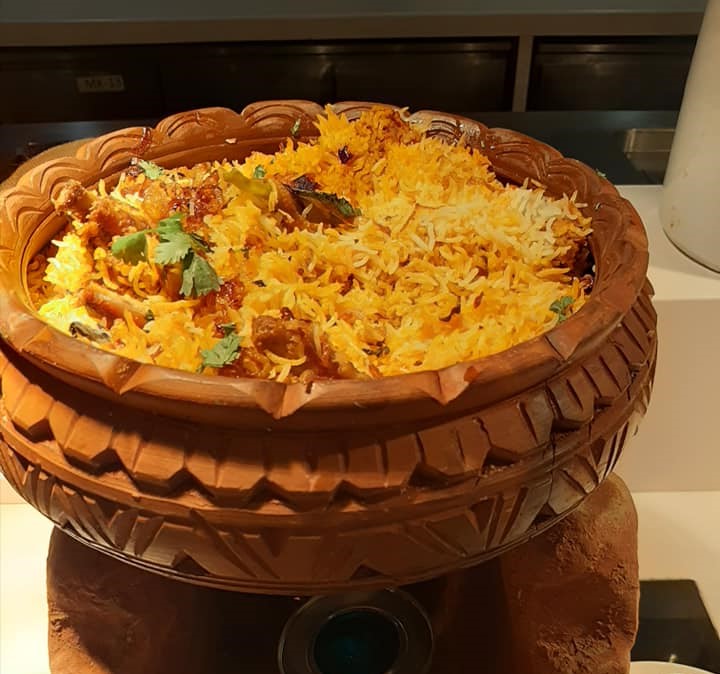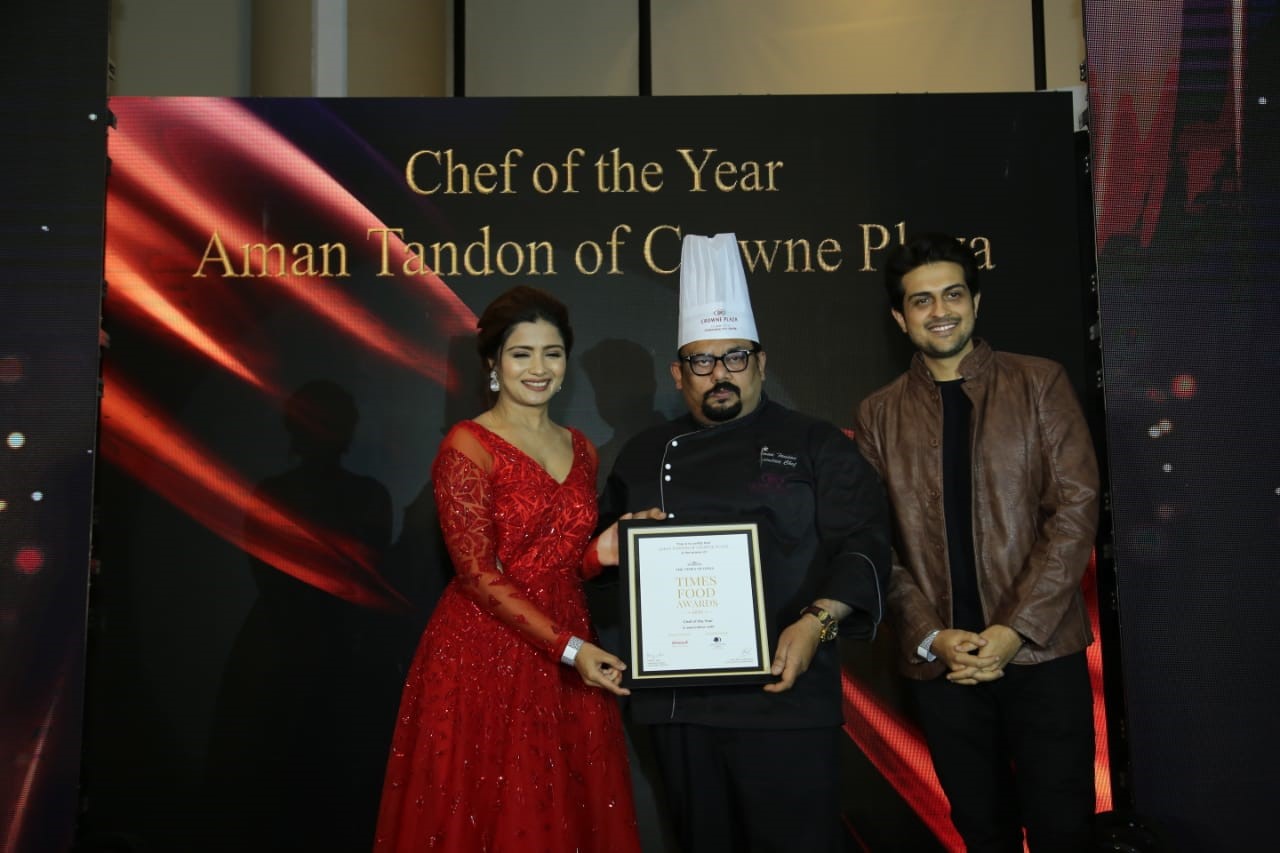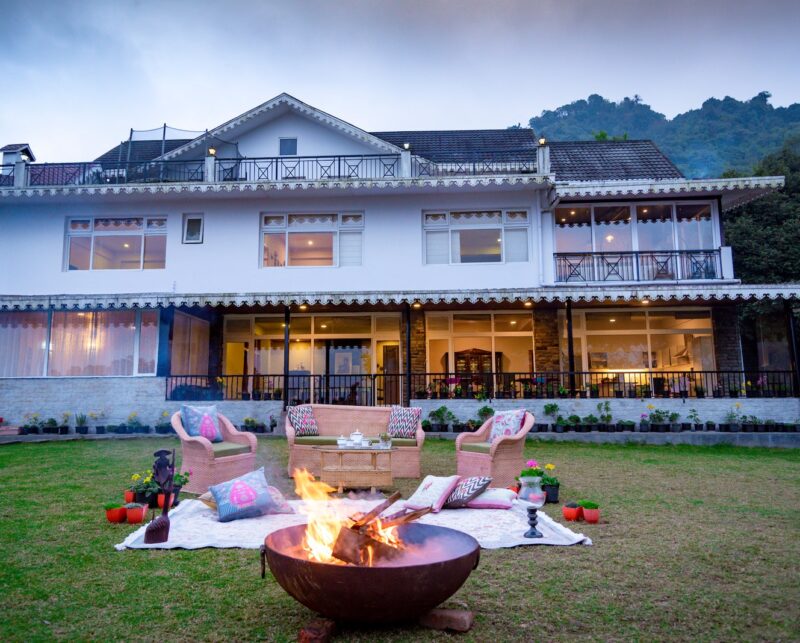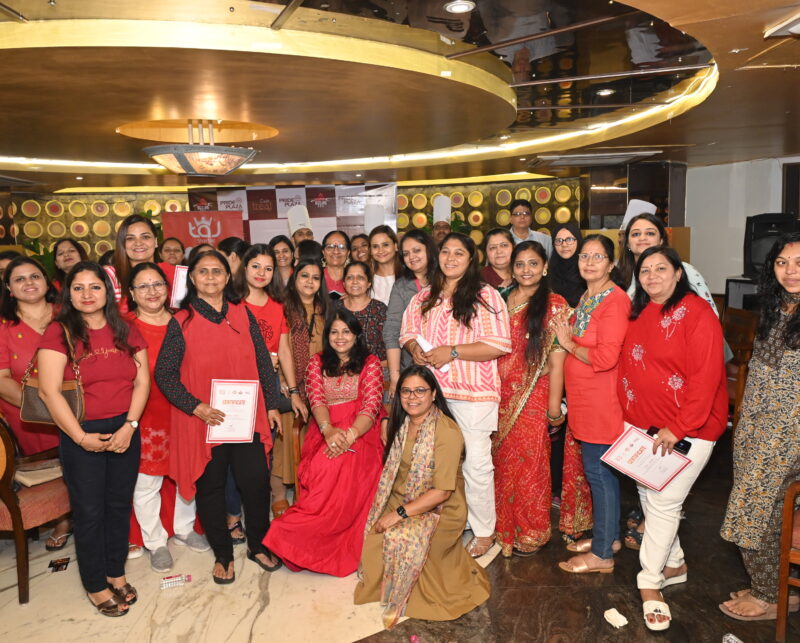The Mughal Empire controlled much of South Asia from the mid-1500s to the early-1800s. Though the Mughal Emperors hail from what is today Uzbekistan, Humayun’s exile in Persia led to increasing Persian cultural influence in the Mughal Empire. They were specially impressed by Isfahan with its grand buildings, palaces, tiled mosques and minarets. paintings and artifacts. The fame of Isfahan led to the Persian pun and proverb “Esfahān nesf-e- jahān ast”: Isfahan is half of the world. Besides Perso–Islamic architecture that blended with India’s own architecture to create grand Mughal buildings, and the refined miniature paintings and enamel work, the Mughals were also patrons of good food. Mughlai cuisine was born blending Indian ingredients and traditions with influences from Persia, the Arab World, Central Asia and the Caucasan countries. Distinctive Persian cooking techniques like marinating meats using curds,mixing almond and dry fruits in milk, using rose to flavour food, mixing fruit juice with crushed ice to create sherbats, making confectionery like halwas, biscuits, puddings and sweet meats covered with a thin beaten gold or silver tissue (Varaq), became part of Indian cuisine in the Mughal-dominated north and central India. From Kashmir and Punjab to Awadh rich curries made with cream, saffron, nuts and dry fruits flowered. Akbar’s kitchens had cooks from various lands, and they learned from each other creating some exciting synthesis.
The Nawabs of Awadh and Hyderabad refined the Mughlai cuisine. Asaf-ud-Daula. Nawab of Oudh (Awadh) in the 1700s who commissioned the flamboyant buildings of Lucknow, was known for his generosity. During spells of scarcity or famine, he would provide food and employment to the public at large. At his Bawarchikhanas (mass kitchens) food was prepared by cooks called Naanbhais in huge degs (urns or pots) and kept sealed with dough so no flavours could escape from them. Thus, workers could be served well-cooked food at a moment’s notice. The resultant flavour and fragrance of the food cooked in this manner gave birth to dum-pukht cuisine traditions of Awadh, influenced by the style advocated during the reign of Akbar. The famous yakhni biryani of Lucknow is said to have been created in these Bawarchikhanas.
This collection of recipes makes a great feast for those who love the royal and elaborate Mughlai cuisine.
1. SANDALI MURGH MIRZA HASNU
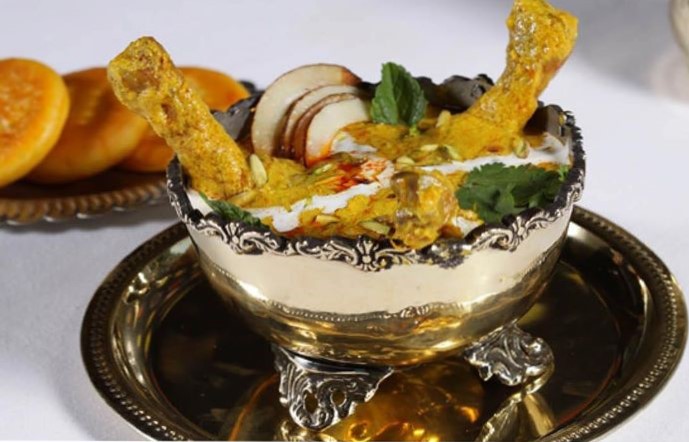
This dish is named for Mian Mirza Hasnu, the head cook or darogah e bawarchikhana of the Nawabs of Awadh. He was known to create delicate dishes for royal feasts hosted by the Nawabs, who took pride in being food connoisseurs.
Preparation time: – 45 mins
Cooking time: – 25 mins
Yield: 4 persons
Ingredients:
- 1 kg chicken drums ( leg pcs )
- 4 cups plain curd/yogurt (without whey?)
- 2 tsp ginger paste
- 3 tsp garlic paste
- 1tsp turmeric powder
- 3 tbsp white sesame seeds, ground
- 2 cup almonds, blanched and ground
- 2 tsp cassia buds
- 4 tbsp desiccated coconut roasted on tawa
- 2 green cardamom pods
- 4 cloves
- 1 tsp royal cumin seeds
- 1cup desi ghee
- 1 kg onions, thinly sliced , browned & ground
- 2 tbsp lemon juice
- Saffron few strands dissolved in hot milk
- ¼ tsp chandan powder
- 1 tbsp sundried rose petal powder
- Salt and seasoning to taste
How to make:
- Clean the legs of chicken and coat with the ingredients listed from 2 to 8.
- Allow the chicken to marinate for a couple of hours.
- Cook the dry spices on a skillet and then grind to make a paste.
- Heat ghee in a pan, add whole garam masala ground pastes and cook till you can sniff the aroma of spices.
- Add the marinated chicken to the masala and stir well.
- Moisten with a little water and cook till the chicken is tender.
- When the chicken is cooked, add the freshly crushed aromatic saffron and rose petals, and then finish with lemon juice.
- The dish is now ready to serve.
This chicken dish tastes best with rice.
2. DUM KE DOODHIYA BHOOLEY
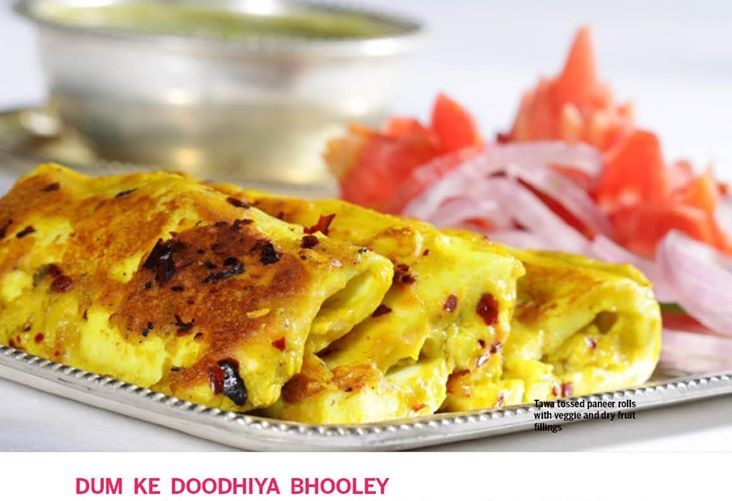 The kitchens of the Nizam of Hyderabad were great laboratories that produced some of the finest dishes. Besides Mughal and regional influences, the team of chefs brought in influences from Turkey, Greece and other lands. This vegetarian dish is an ode to the food of Hyderabad – butter-soft cottage cheese rolled with assortment of veggies and rich dry fruits and seared on a mahi tawa , this is said to have been specially createdat the palaces of Hyderabad for some of the Hindu Rajas and jagirdars of the Deccan did not east meat.
The kitchens of the Nizam of Hyderabad were great laboratories that produced some of the finest dishes. Besides Mughal and regional influences, the team of chefs brought in influences from Turkey, Greece and other lands. This vegetarian dish is an ode to the food of Hyderabad – butter-soft cottage cheese rolled with assortment of veggies and rich dry fruits and seared on a mahi tawa , this is said to have been specially createdat the palaces of Hyderabad for some of the Hindu Rajas and jagirdars of the Deccan did not east meat.
Preparation time: – 30 mins
Cooking time: – 15 mins
Yield – serves 4
Ingredients
- 60 g roasted pine nuts
- 30 g almonds fried in desi ghee
- 30 g raisins
- 50 g seedless apricots
- 10 g caraway seeds (Ajwain)
- 60 ml ghee
- 3 g shahi jeera
- 5 g black mustard seeds
- 5 g chilli powder
- 3 g turmeric powder
- 5 g cumin ( shahi jeera) powder
- 20 g curry leaves
- 20 g chopped green chillies (to add a spice to sweet dry fruity flavors)
- Salt to taste
- 2 g garam masala powder
- 300 g malai paneer
- 20 g fresh chenna / parmesan cheese, grated
- 5 g green cardamom powder
- Rosewater – Meetha kewda or rose essence
- Few strands of saffron dissolved in hot milk for colour and aroma
- Ghee for frying
- 10 g chaat masala
- 100 g carrot ,capsicum . cabbage and potato each
For the coating
50 g roasted gramflour powder
2 g yellow chilli powder
Salt to taste
2 g turmeric powder
2 g shahi jeera
Method
- Cut the carrot, capsicum, cabbage and potato into juliennes.
- Heat the ghee in a pan on low heat and add shahi jeera to it. Saute the chopped vegetables. Add the masalas and lastly the dry fruits. Mix well and keep aside.
- Slice the paneer into thin rectangular pieces – about 3 inches x 2 inches. Top each of the paneer slices with vegetables, grated cheese, cardamom and rosewater then roll them up so that each slice becomes a roulade with the filling inside.
- In the meantime, mix the flour, corn flour, yellow chilli powder and turmeric powder, salt and the shahi jeera to make a thin batter. Make a thin batter. Lightly coat the paneer rolls with this batter. Sprinkle breadcrumbs over them to add crunchiness.
- Fry or grill the roulades in ghee on a pan till each one is done and has a nice golden colour.
- Sprinkle chaat masala and chilli flakes before serving.
3. KHAM KHATAI AKBARI
Preparation time: – 50 mins
Cooking time: – 25 mins
Yield – Serves 4 persons
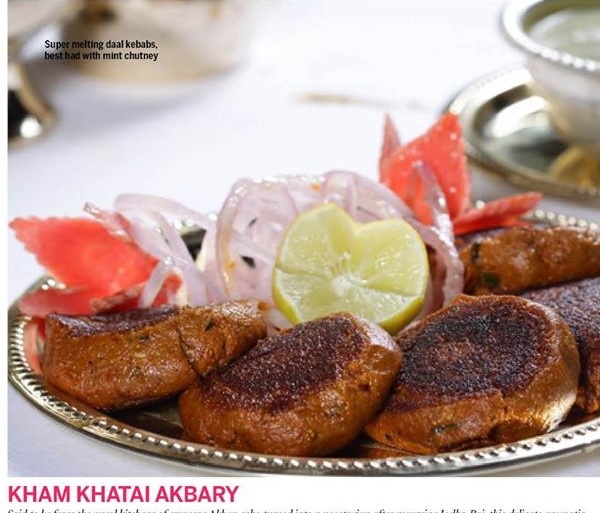
There are many stories about why Akbar turned vegetarian and the strong position of his Rajput wife, Jodhabai, in his harem. This dish is said to have been the result of the synthesis of Rajasthani and Mughal cooking. The blend of moong , moth and mallika daal is the chief ingredient, and with the delicate spices typical of Mughlai meat dishes this becomes like a mock-meat dish for a person who has turned vegetarian recently.
Ingredients
- Desi ghee for deep-frying
- 4 cup sliced onions browned
- 2 tbsp finely chopped ginger
- 1 1/2 tsp finely chopped green chillies
- 1/4 tsp turmeric powder
- 1/2 cup brown moong , bikaneri moth and mallika e masoor daal (soaked overnight, boiled and lightly mashed)
- 3/4 cup potatoes (boiled, peeled and mashed)
- 1 tbsp chopped coriander
- 1/2 tsp garam masala
- Few drops of rosewater – sweet kewda / kewda water
Salt and seasonings to taste
Method
- Heat the oil in a deep pan on a medium flame. Deep-fry the onions till they are golden brown. Drain on absorbent paper and keep aside.
- Saute ginger and green chillies in ghee. Add mashed daals , boiled potatoes, coriander, turmeric powder, golden fried onions, few drops of kewda, and cook for 3-4 minutes.
- Form the mixture into flat, round patties.
- Deep-fry the kebabs in heated oil till each one is golden brown in colour from both sides.
Drain the oil on absorbent paper and serve hot.
4. MALLIHABADI KAKORI KHAAS MUGHAL
The National kebabs of Lucknow is justly famous. The meat is ground to a fine paste, various spices are added, and then they are rolled into balls or lozenge-shaped patties to be skewered and grilled or fried till they are crispy outside but soft and silky inside. Nawab Asaf was known to be toothless and so kebabs like the Galouti were created for him. The Kakori is said to have been created to rise to a challenge by a British officer to prepare a refined and fine dish. The melt-in-your-moth texture of the kakori was a fitting reply by the cooks of the Nawab’s kitchen.
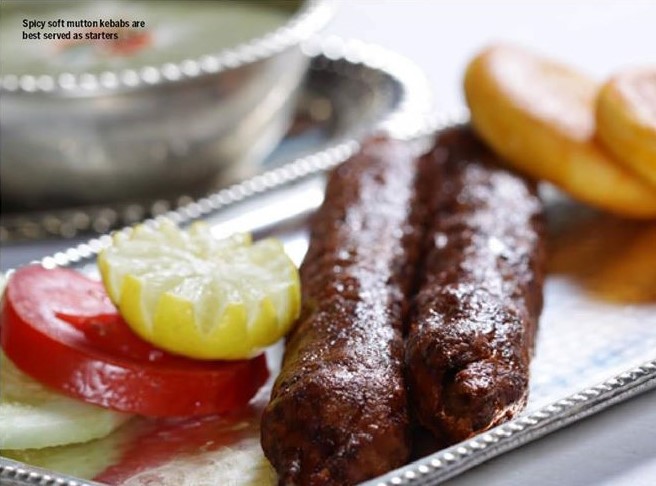
Kakori is famous for the “Malihabadi” brand of mangoes. Each mango season, “mango dinners” are very famous in the mango orchards of Awadh. – during the days of the Nawabs, a variety of chilled mangoes was served in great style with newest of delectable food creations by the rakhabdars of the royal kitchens of Awadh.
Preparation time:1 hr
Cooking time: 45 mnts
Yield – Serves 4
Ingredients
- 1 kg minced mutton
- 100 g mutton fat
- 75 g raw papaya skin for the tenderizer.
- 1 tsp ginger (chopped)
- 1 tbsp Kashmiri chilli powder
- 1 tsp garam masala powder
- ½ tsp black cardamom powder
- 1 tsp coriander leaves (chopped)
- ¼ tsp jeera powder
- 2 eggs (beaten)
Salt to taste
Method
- Mix the minced meat and fat with the ginger, kashmiri chilli powder, garam masala, black cardamom, cumin powder and salt.
- Add the beaten eggs to the meat and mix well to obtain an even mixture.
- Shape this mixture into cylindrical rolls on a thick steel skewer using your hands that should be a bit wet.
- Cook the kebabs in a clay oven or over a charcoal grill for roughly 7 – 8 minutes, or till done. Gently press the kebab, if it springs back, it’s perfectly done.
Serve the kebabs while hot with mint chutney and lemon wedges.
5. ROHILI LAZEEZ ASHARFIAN
The Nawabs of Rampur were known for their fine foods, lending refinement to the cuisines of northern India. Lazeez Asharfian, which literally means delicious bottle gourd, is one of the popular vegetarian dishes of Rampur. The bottle gourd is a popular vegetable during the summer season and lazeez lauki is a delicious dish stuffed with khoya and nuts in lightly spiced gravy which is a delight to your taste buds.
The people of Rohilkhand, a region in the state of Uttar Pradesh with strong Pashtun influences of Afghanistan, marinate meats in curd and spices which helps to soften the taste and texture, at the same time removing any undesired odors from the fleshy materials. The meats are then grilled using skewers. What goes best with these kababs are rotis or bread that are made of flour according to Rampuri cuisine.
Preparation time: 1 hr
Cooking time: 45 mins
Yield – serves 4
Ingredients:
- 1 tsp chilli powder
- 8 cloves
- 200 g ghee/oil
- 4 Mace
- 800 g bottle gourd (Lauki)
- 10 cardamoms (green)
- 100 g cashew nuts
- 50 g chironji/charoli seeds
- 500 g curd
- A few sprigs of green coriander
- 1 tsp kewra water
- 250 g khoya
- 8 onions
- 50 g poppy seeds
- A pinch of saffron
Salt to taste
Method
- Wash and peel the gourd. If it is too long, then cut into two halves. Remove the pith with a thin and long blade. Prick the outside uniformly with a fork. Apply a teaspoon of salt all over and keep aside for 15 minutes.
- Meanwhile, fry the finely sliced onions till they are well- browned and then grind to a paste.
- Fry cashew nuts and chironji separately in the same ghee till they gain a pink colour and then remove.
- Coarsely chop cashew nuts and keep in a separate pan.
5 Crumble khoya and keep stirring till it turn to a pinkish hue. Mix the fried nuts in it and keep aside. Grind cloves, cardamom and mace to a paste.
- Lightly roast the poppy seeds on a griddle and grind to a paste, mixing with some curd.
7 Pat the gourd and fry it in the ghee previously used till it is evenly brown all over. Drain the ghee.
- Now in the khoya, add ¼ teaspoon of salt and 2 tablespoon of curd. Blend well. Stuff the mixture inside the gourd.
- In the curd, mix the onion paste, poppy seed paste, garam masala paste and the saffron dissolved in kewra water. Also add the chilli powder and salt and blend well. Grease a cooking vessel, spread the curd mixture and the remainder of the ghee on it. Then cover with lid and place live charcoal fire on it. Also apply low heat from below. Cook for 30 minutes or till the gourd is done.
Serve hot on a platter garnished with sprigs of coriander.
6. BADAL E JAAM
The Maharajas of Kashmir when they visited Mughal Viceroys like the Nawabs of Awadh took with them morels called gucchi, aubergines and turnips as gifts. These exotic vegetables and mushrooms became part of the royal cuisines of these princely states. Badal e Jaam can be served as a side dish, appetizer or Hors d’oeuvres.

Preparation time: 20 mins
Cooking time: 15 mins
Yield – Serves 4
Ingredients
- Medium sized Aubergines sliced into 2.5 cm thick chunks
- Onion finely chopped – 2
- Ginger grated – 1 tbsp
- Garlic cloves crushed – 8
- Green chillies finely chopped – 5
- Medium sized Tomato chopped – 4
- Button mushroom sliced – 1 cup
- Cumin powder – 1/2 tsp
- Sugar – 1/4 tsp
- Coriander leaves chopped – 2 tbsp
- Salt – to taste
- Oil – as needed
- For Garnishing:-
Yogurt cream/curd (without whey?)
Mint leaves/Coriander leaves
Chopped tomatoes
Method:-
- Preheat broiler on high heat. Line the pan with foil and brush it generously with oil.
- Place the eggplant slices in the pan in single layer, drizzle with a little oil and spread the oil with your fingertips.
- Sprinkle salt over the slices and rub it gently.
- Broil or grill them (around 6 inches below the heat source) for 5 minutes.
- Turn them over and broil or grill for further 5 minutes, then remove from the heat.
- Preheat the oven to 375 F/190 C.
- Meanwhile, heat oil in a pan and saute the onions until they soften.
- Add ginger,garlic and green chillies and fry for a minute then sift cumin powder and tomato to the mixture, let it cook for 1 minute
- Stir in the mushroom slices, tomato puree,sugar and salt. Simmer and cook gently for 5-6 minutes.Mix in the chopped coriander leaves to the prepared mixture, remove it from heat and spread over each of the eggplant slices.
- Cover the pan with a piece of foil and bake in the centre of the oven for 15-20 minutes.
Serve after garnishing with yogurt and mint.
7. GOSHT MUTANJAN KHASGI
This sweetish rice dish is said to have been introduced from Kashmir to the Mughal kitchens, and was called Nuskha-e-Shahjahani.
Ingredients:
|
|
Method
| • | Sift the onions, cinnamon, cloves, 8 peppercorns, 4 cardamoms, and coriander to a small bowl. Next, take a clean cotton cloth and tie all the above ingredients to make a potli bag. Keep it aside. |
| • |
Place the potlis on a pan, along with lamb, salt and enough water to cover it. Cook it till the water is reduced to half and let it cool a bit. |
| Remove the potli and squeeze out the flavor in the pan itself. | |
| Add sugar and lemon juice in the same pan and cook it till it gets syrupy and glazy. Keep it aside. | |
| • |
Take another deep pan and boil rice in water with the other left spices and some salt. Cook till the rice is half done and then drain out the water. |
| • |
Take a casserole and grease it. Now, arrange a layer of rice, then the lamb and again the layer of remaining rice. |
| • |
Pour saffron milk over top, sprinkle crushed almonds over it, cover it tightly and let it Cook on dum / slow fire for 30 to 35 minutes. |
| • | Serve hot. |
8. HYDERABADI KACCHE GOSHT BIRYANI
( The Hyderabadi biryani is a one of the most popular all time treat . A combination of rare deccan spices of Hyderabadi Potli masala with goodness of basmati pearls and supreme cuts of succulent mutton which is marinated and tenderized in such a way that both seasoned lamb and rice get cooked on a slow flame in perfect 50 minutes in a patili . Only comes perfect with dexterity and practice over the years … A true delicacy .)
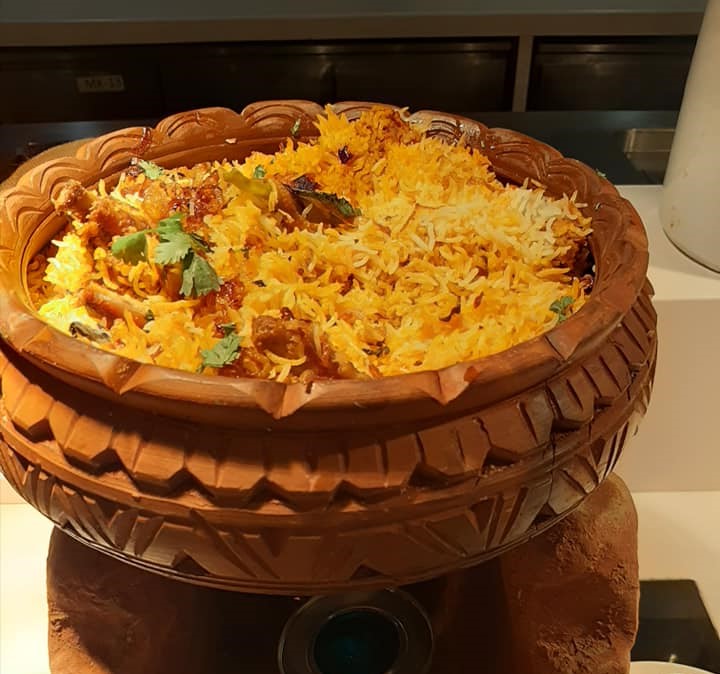
Ingredients:
- Mutton chunks : 1 kg
- Basmati rice : 1 kg
- Onions : 1 cup (thinly sliced)
- milk : 1 cup
- Ginger and garlic paste : 2 tea spoon
- Chilli powder : 3 tea spoon
- Turmeric : 1/2 tea spoon
- Cashew nuts : 100 g
- Bay leaves : 4 to 5
- Cloves : 5 to 6
- Cinnamon sticks : 1 inch long
- Cardamom pods : 3 to 4
- Mint leaves : 5-6 strands
- Coriander leaves : 4-5 strands
- Garam masala powder : 1/2 tea spoon
- Lemon : 1
- Ghee (clarified butter) : 1 cup
- Oil : 4 table spoons
- Yogurt : 1/2 cup
- Saffron : 6-8 strands
- Salt to taste
Preparation Method :
- Mix turmeric, chilli powder, salt, garlic paste, yogurt and 1 table spoon of lemon juice add cleaned mutton pieces to absorb well to allow the pieces marinate for an hour.
- Heat 4 table spoons of desi ghee in a vessel. Roast cloves, cumin, cinnamon, cardamom, 1/2 spoon cumin, 1 spoon coriander powder,bay leaves and 1cup onions.
- Cook it for 1-2 minutes and then add some mint leaves.
- When the onions turn golden brown, add the marinated mutton pieces and cook for about 30-35 minutes.
- Note that the meat should not be fully cooked at this stage.
- Now add garam masala powder and milk and turn off the flame once the lamb is about 3/4th cooked.
- See to it that the gravy should not be much and also, the lamb pieces should look as if they have been roasted.
- Meanwhile, when the mutton is still cooking, prepare the biryani rice.
- Wash 3 cups of basmati rice and add water slightly less than the quantity of the rice itself so that it is only half cooked, correcting the seasoning .
- Soak 3-4 strands of saffron in 4-5 table spoons of milk.
- Now take 1table spoon of this half cooked rice and dip it into the saffron flavored milk.
- Take a utencil having a base of 12″ and place half of the semi-cooked rice in it.
- Prepare a layer of half of the above prepared lamb on top of this rice layer and again, top the meat layer with rice (half of the remaining) , alternate the process .
- Heat 2-3 table spoons of ghee and deep fry 1/2 cup onions until they turn golden brown. Next, roast the cashews with Garnishing the top layer of rice with the fried onions, cashews, ghee, coriander and the saffron flavoured rice.
- Cover the vessel with a lid and place it on a high flame for about 5 minutes. Note that the flame should not concentrate at the vessel’s center, but on one side of it.
- Wait for 2-3 minutes and rotate the vessel to heat the opposite side. This way, keep rotating the vessel every 2-3 minutes for about 20-25 minutes. Every time you rotate it, carefully disturb the contents by a small jerk so as to avoid settling of ghee at the bottom.
- Turn off the flame and keep it aside for 10 minutes before taking off the lid.
- Before serving, mix thoroughly, the medley from the bottom.
Serve with onion rings , burrhani raita, salan and mint relish,.
9. GULABI JOSHANDA
(A refreshing Rose flavoured milkshake sweetly blended with sugar candy , rose candy , khurchan malai , cardemeom powder and touch of saffron – A perfect hydrator and refreshing drink from the royal kitchens of Oudh relished throughout the peaking summer )
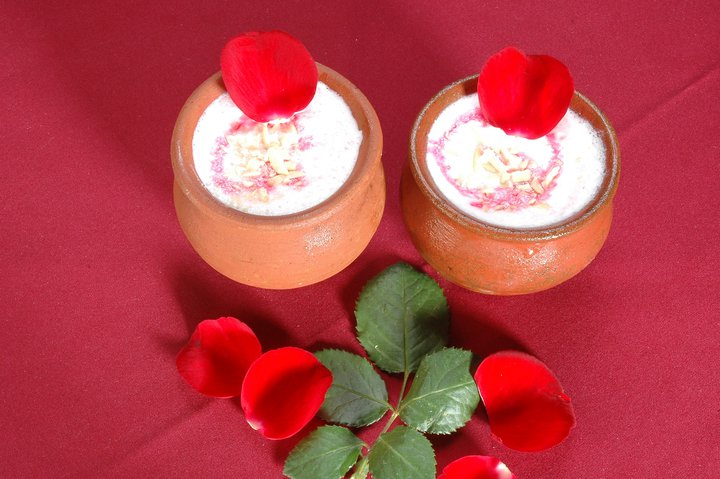
Ingredients:
4 cups Milk (use skimmed milk, if you want to reduce fat content)
250 gms Sugar candy or Honey to taste
80 gms. Almonds, blanched and peeled (you can use ready blanched ones)
50 gms. Pistachios, blanched and peeled
1/2 tsp. Green Cardamom Powder
Few drops of diluted saffron strands
4 tsp. GULKAND
Few drops of Rose water
A few fresh rose petals. Prefer using organic wild rose petals, insecticide free./ if unavailable else it can be substituted with rose syrup
Few Ice Cubes
150 gms Rabdi (readymade)
Instructions
boil the rose petals in 500 ml water on a slow flame to extract of the natural colour and essence of fresh natural rose flower, sieve out all the blanched rose petals.
Add sugar candy to this rose blended water and make homemade rose syrup and refrigerate to cool.
Place remaining all ingredients, except ice, in a blender and grind until smooth. It takes only a few seconds.
Add the dry fruits paste to the milk, sweeten and flavour it with the stewed rose syrup.
Place a couple of ice-cubes in each glass and pour over the milk shake.
Garnish with a few rose petals in each earthenware tumbler as it imparts porous earthy flavours and keeps cool also .
Serve cold garnished with a heart shaped rose and flakes of almonds to give the crunch of a taste, laced with the creamy Rabdi.
Notes
It can be made in advance and kept in the fridge. Don’t add ice and rose petal garnish until just before serving.
Preparation Time: 30 Minutes
Serving: 6 People
10. NAYAB SEVIYON KA MUZAFFAR
( Traditional dessert made on Eid globally is donne in a new avatar sevion ka muzaffar as a deconstructed shell to hold caramelized dry fruits, sweetened couscous, chops of seedless dates and figs .. made healthy and yet avant garde technique to create a wow factor )

Ingredients
1 packet semolina vermicelli ( NON ROASTED only )
Few drops – Sweet essence of Kewda
water to sprinkle
desi ghee to deep fry the sevian mould .
½ gm saffron diluted in 30 ml water to flavour sugar syrup and moist vermicilli
1 lt sugar syrup ( 2 strings consistency ) to sweeten the moulds .
For Stuffing the shell
100 gms of Mava or condensed milk solids
100 gms of cashew nuts praline – nougatine .
100 gms of almond slivers
75 gms stewed apricots
Saffron a few drops diluted
50 gms slivers of roasted pistachio
100 gms couscous parboiled, dried and caramelised.
300 gms of sugar to form caramel and make dry fruit pralines
Direction
In a flat dish spread vermicelli and sprinkle little water to moisten and make it pliable to spread over the hemispherical structures of bowl/ wired strainer.
In a small mould or katori apply ghee and with light hands, evenly spread at the vermicelli in mould and compress it with a larger tea strainer to give shape.
Heat ghee in a skillet and deep fry the compressed sevian with a wired round strainer mould to form a shell. Cool on wire rack and de-mould it.
Dip each cooled mould into Luke warm sugar syrup flavoured with saffron reduction and green cardamom
Powder to finish the sevion ka muzaffar as a deconstructed shell to hold caramelized dry fruits, sweetened couscous, chops of seedless dates and figs.
Serve it as an energy dessert loaded with highly nutritious goodness of dates , crunchy dry fruits with mildly scented with traditional Mughlai sweet vetiver , a truly relishing dessert as the last course at the finish to the IFTAR feast after a month long of holy fasting.
Preparation Time: 55 Minutes
Serving: 8 People
11. ANANAS KA MUZAFFAR
( Pearls of basmati with goodness of Kashmiri saffron , mildly flavoured with whole spices and exotic flavours of Mauritian pineapple chunks and juice – A royal treat of exotic dessert , a perfect recipe for the auspicious occasion of Eid spreading lip smacking traditional Mughlai flavours of brotherhood and prosperity all around )

Ingredients
One Cup Basmati Rice.
Two Cups Sugar. Or To Taste
One Cup Pineapple Juice.
1 TBS Lemon Juice.
5 Cloves.
5 Green Cardamom.
5 Fresh Pineapple Rings, Chunk Cut.
Quarter Cup Ghee.
2 Tbsp Assorted Slivered Dry Fruits
2 Tbsp Sweet Mava
A few strands of saffron diluted in milk for flavor and bright saffronic colour .
½ cup of mix dryfruits for garnish
Direction
Rinse and soak the rice for 2 hours. Drain.
Soak the saffron in two TBS warm water.
Boil sugar with half a cup water, pineapple and lemon juices; stir until the syrup becomes thick. Reserve.
Heat four cups water in a pot with the cloves, cardamom pods and saffron dissolved to extract flavours and yellow colour. Boil for five minutes, skim out the spices with a kafgir, and add the rice.
Cook till puffy and half way done. Drain.
Heat the syrup over low heat to boiling, add the rice, mix well and remove from the fire when heated through, whereupon stir in the pineapple chunks and the saffron water.
Transfer the rice mixture to a shallow casserole, place the lid on tight and set the casserole in the oven at 300 degrees for half an hour.
Melt the ghee and pour it in a circular motion all over the rice.
Garnish well with slivered dry fruits, grated.
Note
Muzaffar means yellowed. Which allows a liberal use of both Flavor and Color Imparting Saffron, it will indeed be a dessert of it’s own kind with both sweetness and a tingling after taste of the citrus juices .
This dish can also be done with mango (Aam Ka Muzaffar) or even jackfruit (Kathal Ka Muzaffar).
Hope your friends or family will like Friends Ananas Ka Muzaffar made by you! Stay tuned for more recipes from our chef.


